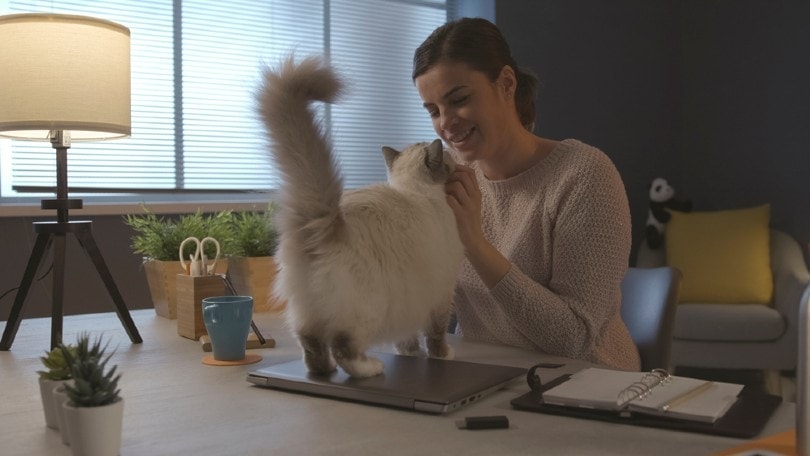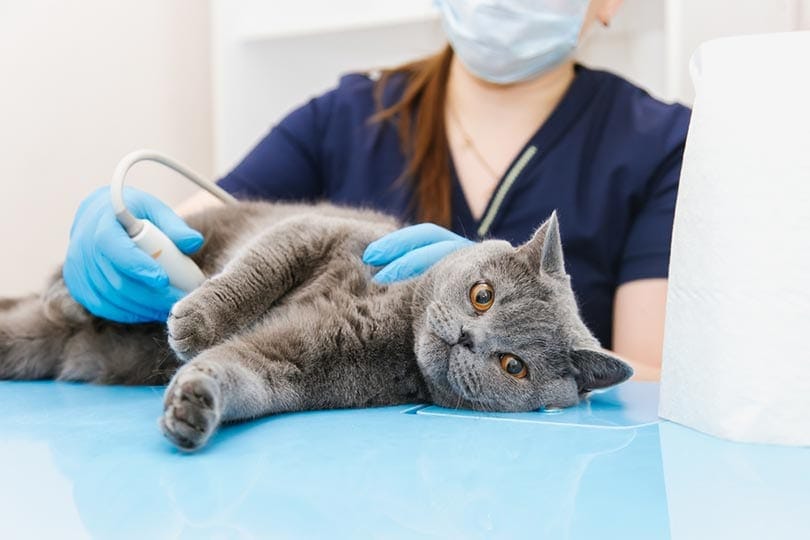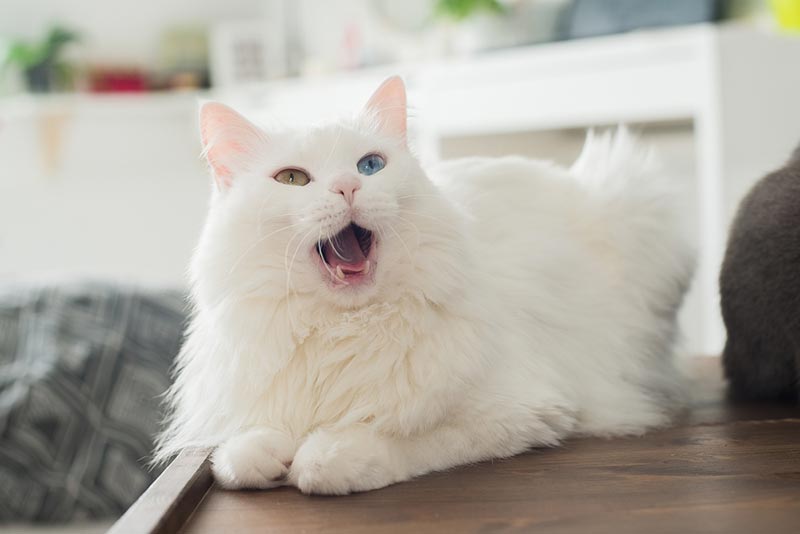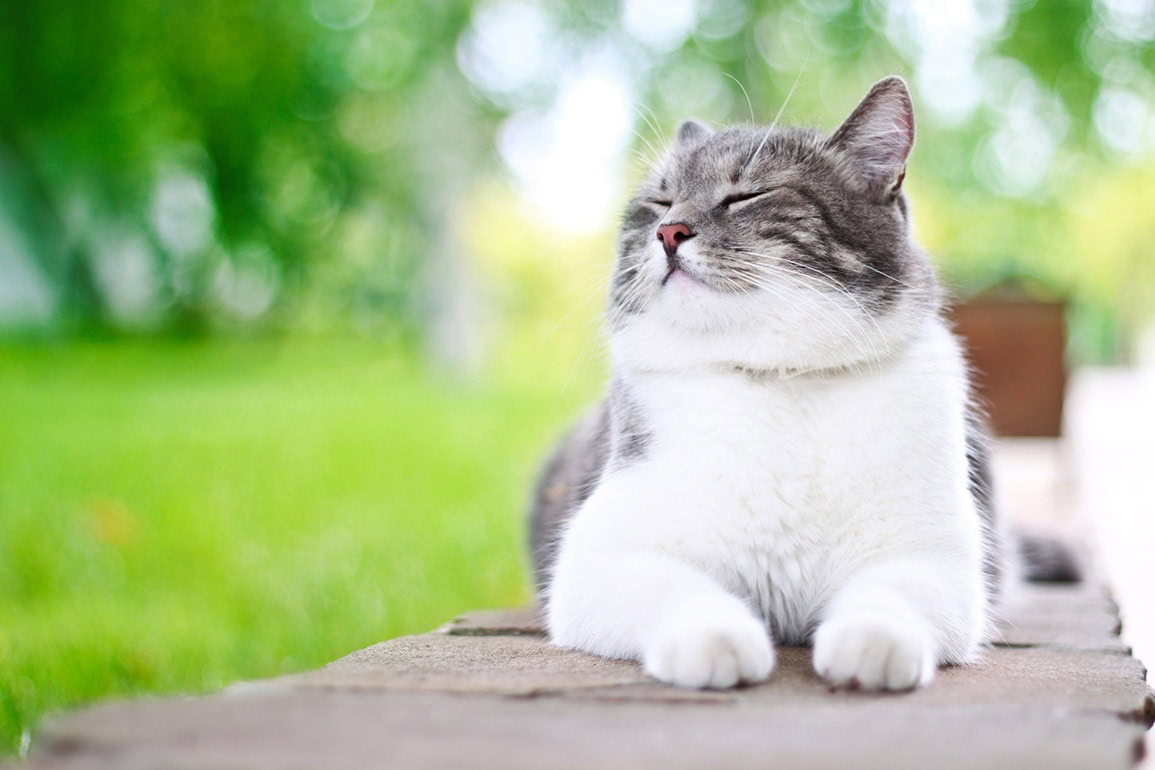VET APPROVED

The information is current and up-to-date in accordance with the latest veterinarian research.
Learn more »It’s undeniable that receiving sweet, gentle meows from your cat is a heartwarming occurrence that leaves you wanting more. Unfortunately, some people do get much more meowing from their cats, sometimes seemingly incessantly. As much as we love to hear our cats meow at us, it can start to drive anyone bonkers when their cat just won’t stop.
What does it mean when your cat starts meowing all the time? How can you fix it? Should your cat see a vet? Why does my cat meow so much? Here are some reasons that your cat may be meowing all the time:
The 8 Reasons Why Your Cat Meows So Much
1. Boredom
If your cat is bored, they may wander the house, meowing as they go. If you have a home pet camera, you may even catch your cat meowing when nobody is home to hear them. Bored cats may meow in the hopes they will find someone who hears their meows or they may do it simply because it’s something to do.
Try to make your cat’s environment more enriching and fun. Cats that don’t have excess energy left over usually don’t get bored. Spend time with your cat every day, using a variety of toys, games, and puzzles to keep your cat’s attention and help them burn the most energy. You can also add things to your home that can help occupy your cat when nobody is home, like different types of scratching posts, window perches, puzzle feeders, interactive toys, and even a catio if possible.
2. Attention
Cats are very smart animals, and they are perfectly capable of learning which behaviors get them the most attention. If your cat is feeling a lack of attention and wants some petting, they may start meowing at you. Some cats will follow you and meow at you incessantly until you pay attention to them.
First off, try not to give in to this behavior. Giving your cat attention when they’re being obnoxious is a great way to teach your cat that this undesirable behavior is OK for them to do.
The next thing you should do is take an honest evaluation of how much time is being spent with your cat. Many cats require attention and playtime with someone every day, and higher activity breeds, like Bengals, may need a significant amount of your time.
However, a cat that feels ignored or like they are not getting enough attention may turn to more undesirable behaviors other than just meowing, with many cats urinating outside the litter box or being destructive.

3. Hormones
If you have a cat that has not been spayed or neutered, they may begin to meow a lot once they’ve reached sexual maturity. This is extremely common in intact females when they go into heat. They will not only vocalize loudly, but also roll on the floor, and have a keen interest in the outdoors.
Female cats have multiple heat cycles that can last for several weeks with a short period of calmness in between them. Male cats may also meow as they search for a mate.
The fix for this is getting your cat spayed or neutered. Removing your cat’s reproductive organs will remove the primary source of sex hormones in their body. A female cat that has been fixed will no longer enter a heat cycle, and a fixed male is less likely to meow or seek out intact females.
4. Pain
If your cat is experiencing a painful condition, then might meow incessantly. Usually, pain is accompanied by other signs, not just meowing. Watch for things like inappetence, lethargy, pacing, lameness, and difficulty getting comfortable.
If you suspect your cat is in pain, they need to see a veterinarian as soon as possible. Do not attempt to give your cat any medications without the explicit direction of a vet. Most human pain medications are extremely toxic to cats. Once your vet diagnoses why your cat is in pain, they will be able to provide a treatment plan.
5. Illness
If your cat is sick, then they may exhibit similar signs as they would if they were in pain. For some illnesses, meowing is a common occurrence. It may cause your cat to meow from discomfort or an overall sense of not feeling well.
Take your cat to a vet if you think they may be sick. The number of conditions that may lead to your cat experiencing discomfort and not feeling well means that your cat must be assessed by a veterinarian. There may be a simple thing wrong with your cat, but the discomfort from serious conditions like cancer and kidney disease may also lead to meowing.
6. Urinary Issues
Feline lower urinary tract disease (FLUTD) is not uncommon in cats. Sometimes, cats will form crystals in their bladder. These crystals can be dislodged from the bladder, exiting through the urethra. Small crystals might be passed without issue, but calculi or stones can obstruct your cat’s urinary tract. If their urinary tract becomes blocked, then your cat will not be able to urinate. This will lead to their bladder filling with urine while unable to empty it. This causes your cat to feel very unwell, vocalize, or become very lethargic. Cats can also suffer from feline idiopathic cystitis or urinary infections.
A urinary blockage is an extremely painful condition for your cat, and it is a medical emergency. Without treatment, your cat may experience kidney failure or a bladder rupture, which can have fatal consequences without treatment. Your cat may yowl or meow during a bladder blockage. You may also notice your cat attempting to urinate over and over without success. Some people mistake this for an attempt to poop.
If your cat is showing signs of urinary issues , they need to see a vet promptly, especially if they have a urinary blockage. If left untreated, a blockage is a life threatening condition. Your cat will need immediate treatment.

7. Cognitive Dysfunction
Many cats age quite gracefully, but some cats will develop some degree of cognitive dysfunction as they get older. Feline cognitive dysfunction will lead to confusion, which may lead to unusual behaviors. You may notice your cat meowing incessantly at nothing, but you may also see other unusual behaviors like looking confused, change in their sleeping patterns, or inappropriate toileting.
If you suspect your cat might be showing signs of cognitive dysfunction, talk to your vet for advice. They will be able to check your cat over to ensure there isn’t another health issue happening, like an infection or a tumor. Once your vet determines your cat has cognitive dysfunction, they may recommend environmental changes, medications, supplements, or special food to help support your cat’s cognition.
You may need to work to make things in your home easier to find, more accessible, and safer for your cat. This can mean adding more litter boxes, investing in ramps, and placing food, water, and litter boxes in places that are easy for your cat to access, like on the floor instead of a shelf or upstairs.
8. Hearing or Vision Loss
Hearing loss can be a chronic or acute issue in a cat. Some cats have difficulty hearing for their entire life, and you may have noticed lots of meowing. Other cats may develop hearing loss later in life due to disease or injury, and they may also meow. This is likely to help your cat feel more oriented and to find other people or animals. A cat with hearing loss is likely unaware of how noisy they might be.
To fix your cat’s hearing loss, you first need to know why your cat is experiencing it. Whether your cat has been deaf their whole life or has experienced an ear infection will change the approach in trying to fix their hearing loss.
In some cases, acute hearing loss can be caused by trauma, infection, or ototoxic medications. You will need to have your cat see a vet to determine the cause of their hearing loss.

Conclusion
There are multiple reasons your cat may be meowing or vocalizing excessively. If you suspect your cat meows a lot due to an illness, injury, or pain, then they need to be seen by a vet as soon as possible. Some very serious conditions can cause your cat to rapidly go downhill if they are not addressed quickly by a veterinarian.
Featured Image Credit: Helen Bloom, Shutterstock













